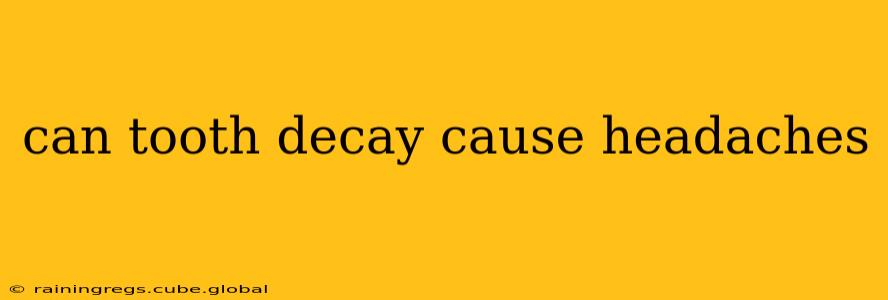Toothaches are undeniably painful, but did you know they can sometimes trigger headaches? The connection between tooth decay and headaches isn't always direct, but understanding the mechanisms involved can help you recognize the symptoms and seek appropriate treatment. This comprehensive guide explores the relationship between tooth decay and headaches, answering common questions and providing valuable insights.
How Can Tooth Decay Lead to Headaches?
The pain from tooth decay itself can lead to tension headaches. Severe toothaches can cause you to clench or grind your teeth (bruxism), which puts strain on your jaw muscles and the surrounding tissues. This muscle tension can radiate to your temples and cause a dull, aching headache, often described as a tension-type headache.
Furthermore, an infection stemming from severe tooth decay can spread, causing inflammation and pressure buildup. This pressure can irritate the nerves in your head and neck, contributing to headaches. In some cases, the infection might even spread to the sinuses, leading to sinus headaches. The pain can vary in intensity depending on the severity of the decay and the extent of the infection.
What Types of Headaches Can Tooth Decay Cause?
While tooth decay most commonly contributes to tension-type headaches, it can also, indirectly, contribute to other headache types. The inflammatory response from a severe infection might exacerbate existing migraines or cluster headaches in susceptible individuals. It's crucial to differentiate between a headache caused by tooth decay and other primary headache disorders.
Can a Cavity Cause a Headache?
Yes, a cavity, which is a form of tooth decay, can absolutely cause a headache. Even a relatively small cavity can become painful if it reaches the tooth's nerve. The pain signals travel along the trigeminal nerve, a major nerve responsible for sensation in the face, including the teeth. This nerve's connection to other cranial nerves can lead to referred pain, making it feel like the headache originates somewhere else than the tooth itself.
How to Tell if Your Headache is from a Toothache?
Differentiating a headache from a toothache can be tricky. Key indicators of a toothache-related headache include:
- Localized pain: The pain is often centered around the affected tooth or jaw, sometimes radiating to the temple or ear.
- Sensitivity to temperature: Hot or cold drinks or foods can exacerbate the pain.
- Chewing pain: Pain worsens when chewing or biting down.
- Jaw muscle tension: You might experience stiffness or soreness in your jaw muscles.
- Visible tooth damage: You might notice a cavity, discoloration, or damage to the affected tooth.
If you're unsure, consulting a dentist is essential for accurate diagnosis and treatment.
What Should I Do if I Think My Tooth Decay is Causing Headaches?
Don't delay seeking professional help! Schedule an appointment with your dentist as soon as possible. Early intervention is crucial to prevent further complications. The dentist can assess the extent of the decay, determine the cause of your headache, and recommend the appropriate treatment, which might involve fillings, root canals, or extractions, depending on the severity of the decay. Over-the-counter pain relievers can provide temporary relief, but they don't address the underlying issue.
Can Tooth Decay Cause Migraines?
While tooth decay itself doesn't directly cause migraines, the pain and inflammation associated with it can trigger or worsen migraine episodes in individuals already prone to migraines. The intense pain and pressure from a dental infection can act as a trigger, leading to a migraine attack.
Conclusion
The relationship between tooth decay and headaches is complex but significant. While tooth decay doesn't always directly cause headaches, the associated pain, inflammation, and infections can lead to various headache types, particularly tension headaches. If you experience headaches along with dental pain or sensitivity, seeking professional dental care is essential for diagnosis and appropriate management. Remember that prompt treatment of tooth decay is vital not only for preserving your teeth but also for preventing associated headaches and other complications.
